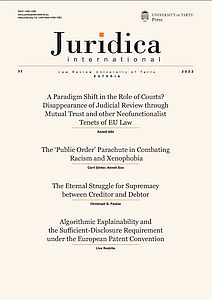Algorithmic Explainability and the Sufficient-Disclosure Requirement under the European Patent Convention
DOI:
https://doi.org/10.12697/JI.2022.31.09Keywords:
algorithm, explainability, patent, sufficient disclosureAbstract
Artificial intelligence and its subsector machine learning differs from traditional programming. For this reason, coupled with its potential benefits to society in many arenas, it has been articulated as one of the key priorities in the European Union. Such characteristics specific to artificial intelligence as models with increased accuracy and generalisation power may accentuate issues of algorithmic explainability that can defy patentability. Accordingly, the article focuses on the legal requirements related to the ‘sufficient disclosure’ criterion under the legal framework for patents as one facet of deciding on the patentability of the invention, and it addresses potential solutions for overcoming issues of algorithmic explainability. The author argues that solutions introducing a system involving deposit of the algorithm, training data, or both might not be as effective a mechanism for tackling those issues as instead implementing a recognised certification system.Downloads
Download data is not yet available.
Downloads
Published
2022-10-25
How to Cite
Rudzite, L. (2022). Algorithmic Explainability and the Sufficient-Disclosure Requirement under the European Patent Convention. Juridica International, 31, 125–135. https://doi.org/10.12697/JI.2022.31.09
Issue
Section
Articles


